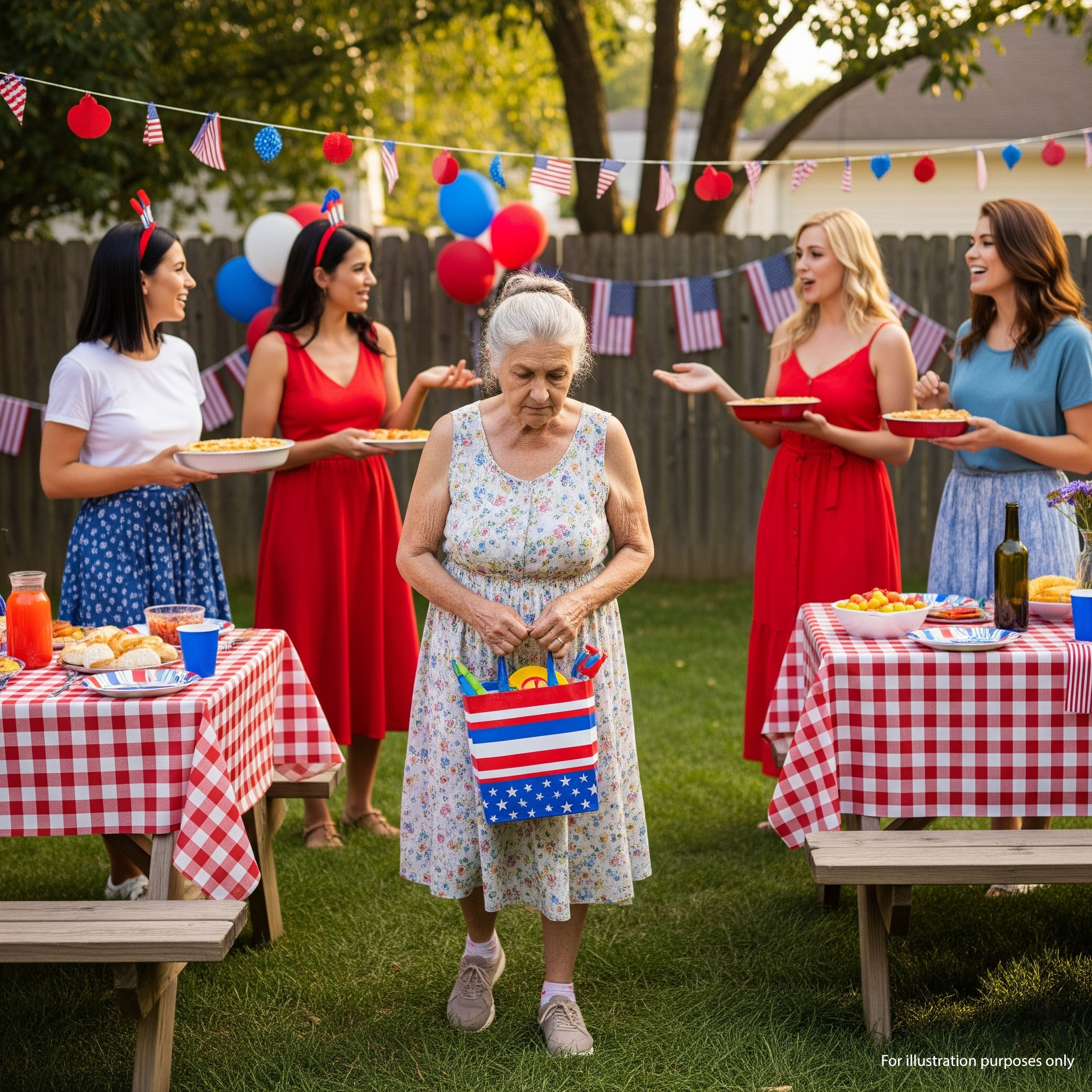“Don’t Bring a Thing,” She Said — Then She Set Me Up in Front of Everyone
They say holidays bring families closer, but that Fourth of July? It nearly tore mine apart.
When Karen—my daughter-in-law—called to invite me to her annual Fourth of July bash, her tone was sugary sweet, with a sharpness tucked underneath like barbed wire beneath velvet.
“Mom,” she said with faux warmth, “you’re a guest this year. Don’t bring a thing. Just come enjoy yourself.”
She said it once. Then again. And then a third time, in a follow-up text.
Not even deviled eggs? My signature peach pie?
“No,” she insisted. “I mean it. Not even a bag of chips. I’ll be offended if you bring anything.”
Her voice lingered in my ears even as I packed a tiny gift bag with some dollar-store toys for the grandkids—little microphones with American flags on them. They didn’t count as “bringing something,” not really. Just a grandmother’s love wrapped in tissue paper.

I put on my festive blouse, curled my hair, and walked in with my heart open and hands empty—exactly as instructed.
And that’s when I realized I’d walked straight into a trap.
Every woman at the party had brought something.
Cherry cobbler. Casseroles. Star-spangled cupcakes. Even Sandra, who burns water, had shown up with patriotic pasta salad. I stood there, gripping my little bag of toys like a lifeline, suddenly more guest than family.
Then Karen stepped up like a master of ceremonies.
Glass in hand. Smile too wide.
“Oh look who’s here!” she chimed, eyes glittering. “And completely empty-handed. Must be so nice to just show up and enjoy the party while the rest of us pitched in.”
Laughter. Polite. Tight. Awkward.
I froze, heat flooding my face. The bag crinkled in my hands. My son Jake glanced over, but quickly looked away. I knew that look. He didn’t approve—but he wouldn’t fight her. Not here. Not in front of everyone.
And certainly not against Karen.
I wanted to say something. To defend myself. To remind her I was only doing what she told me. But my voice caught behind the lump in my throat.
So I stood there—stung, small, and humiliated.
Until one tiny voice shattered the tension.
Emma—my seven-year-old granddaughter—climbed onto a patio chair with one of the toy microphones I’d brought.
She tapped it like she was a reporter.
“Mommy?” she said, her voice clear and high. “Why are you mad at Grandma? You told her three times not to bring anything. I heard you.”
Silence.
Every conversation stopped. Karen’s expression faltered, wine glass mid-air.
And then Emma delivered the final blow:
“You always say we should listen. Grandma listened.”
The silence shattered into stunned chuckles.
Someone muttered, “Well, there it is.”
Karen stared at Emma, then at me, her lips parting—but no excuse came. No denial. Just a hard swallow before she turned and disappeared into the house.

Jake looked at me across the lawn.
He didn’t need to say a word.
I know, Mom.
I’m sorry.
And then Lisa, Karen’s cousin, sidled up beside me with a smile and a plate of cobbler.
“That,” she whispered, “was the best part of the day. You okay?”
I nodded. “Thanks to Emma.”
“I think she inherited your backbone,” she grinned.
Soon, people started approaching me—not out of pity, but solidarity. The kids adored the microphones. One gave an impromptu weather forecast, another pretended to be a news anchor: “Breaking news! Grandma brought the best toys!”
It was innocent. Silly. But healing.
The air shifted. The tension loosened. People started laughing with me again.
Karen stayed away for the rest of the afternoon, hiding behind the grill, behind her curated decorations, behind the mask she wore so well.
But I wasn’t angry anymore.
Because beneath her sharp words and perfect parties, I finally saw it: she wasn’t trying to host—she was trying to compete.
Compete with the quiet bond I shared with my grandchildren. With the effortless way I loved them. With the years I’d spent building a family she was still trying to shape in her image.
She thought if she could control the narrative—make me the odd one out—she’d win.
But what she didn’t count on… was truth.
And truth came wrapped in pigtails and glitter shoes.
That night, as fireworks lit up the sky, I sat on the porch swing with Emma on my lap.
She leaned her head on my shoulder, her hair smelling like watermelon and sunscreen.
“You okay now, Grandma?”
I smiled and kissed her head.
“I am now, sweet pea.”
She looked up at the booming lights above.
“You brought the best thing to the party.”
“What’s that?”
She grinned. “You brought the truth.”

I laughed. And for the first time all day, it felt real.
Some people bring pies.
Some bring pride.
But sometimes, the smallest voices bring justice wrapped in innocence.
And that…
That’s something no hostess can plan for.